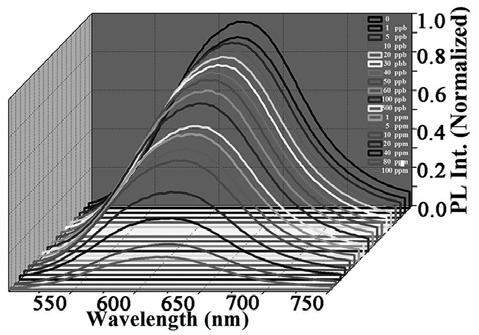Preparation of gold nanocluster based fluorescent composite material and application in ion detection
A nano-cluster, nano-technology, applied in luminescent materials, material analysis by optical means, nano-technology, etc., can solve the problems of expensive copper ion detection, complicated process, long detection time, etc., and achieve short experimental period and preparation method. Simple and easy to synthesize effect
- Summary
- Abstract
- Description
- Claims
- Application Information
AI Technical Summary
Problems solved by technology
Method used
Image
Examples
specific Embodiment approach 1
[0027] Specific Embodiment 1: The preparation method of a nano-fluorescent device with enhanced fluorescence induced by mesoporous silica-confined gold nanoclusters in this embodiment is characterized in that the method comprises the following steps:
[0028] 1. Dissolve 2-5 mmol of chloroauric acid in 20-30 ml of deionized water, 4-10 mmol of glutathione in 20-30 ml of deionized water and ultrasonically dissolve and mix at room temperature respectively to form a uniform Mix the solutions, and react the mixed solution at 70-100° C. for 6-8 h under stirring conditions to obtain solution A. Put solution A into a centrifuge tube and centrifuge at high speed to remove unreacted raw materials, take the precipitate, wash with acetonitrile and water mixed solution for 3 times and dissolve in deionized water to obtain solution B;
[0029] 2. By using the Stöber method, add 15-20 ml TEOS to a mixed solution consisting of 130-160 ml ethanol, 30-40 ml water and 180-210 ml ammonia water a...
specific Embodiment approach 2
[0031] Embodiment 2: The difference between this embodiment and Embodiment 1 is that the ultrasonic power in Step 1 is 60-100 W.
specific Embodiment approach 3
[0032] Embodiment 3: The difference between this embodiment and Embodiment 1 or 2 is that the reaction temperature in Step 1 is 80-90°C. Others are the same as those in the first or second embodiment.
PUM
 Login to View More
Login to View More Abstract
Description
Claims
Application Information
 Login to View More
Login to View More - R&D
- Intellectual Property
- Life Sciences
- Materials
- Tech Scout
- Unparalleled Data Quality
- Higher Quality Content
- 60% Fewer Hallucinations
Browse by: Latest US Patents, China's latest patents, Technical Efficacy Thesaurus, Application Domain, Technology Topic, Popular Technical Reports.
© 2025 PatSnap. All rights reserved.Legal|Privacy policy|Modern Slavery Act Transparency Statement|Sitemap|About US| Contact US: help@patsnap.com



